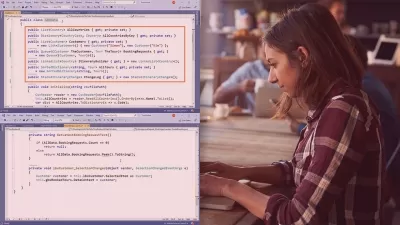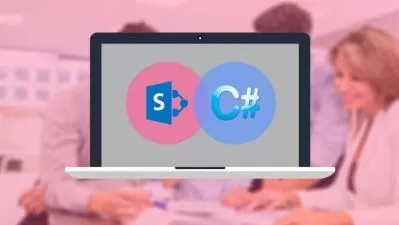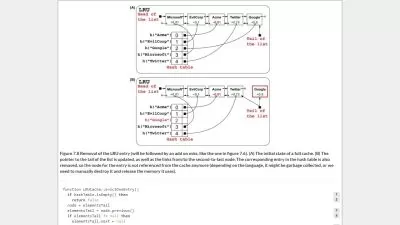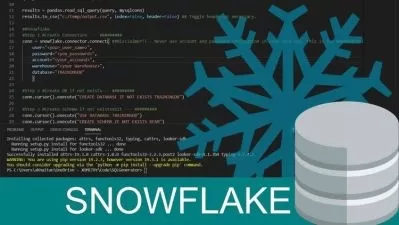Ultimate C# Masterclass for 2023
Krystyna Ślusarczyk
36:15:31
Description
In-depth .NET programming course from basics to advanced. Focus on clean code, performance and practice.
What You'll Learn?
- You will gain an in-depth understanding of C#.
- You will understand how to write high-performance C# code.
- You will understand the principles of object-oriented programming
- You will learn the most useful design patterns.
- You will learn to write code of excellent quality.
- You will gain the knowledge necessary for C# job interviews.
- You will practice your skills by solving exercises in the browser, as well as by creating advanced projects.
- You will learn how to use Visual Studio like a pro.
Who is this for?
More details
DescriptionWelcome to the "Ultimate C# Masterclass" course! Are you ready to take your knowledge and career to the next level?
36 hours of on-demand videos, 58 coding exercises, 51 quizzes, and 12 assignments. All this is to help you start coding in C# like a pro.
I'm a .NET Technical Lead with over 10 years of professional experience. I will help you on this journey every step of the way, no matter if you are a complete beginner who has never coded before or a developer who wants to advance to the next level. We will start from the basics, but we will not stop there.
I will not only teach you how to code but also how to code well. Clean code and good design will be our priorities, and design patterns will be shown in practice, not as abstract concepts that seem impossible to be used in real-life challenges. Refactoring will be something we practice all the time.
Programs written in C# are fast, but we can make them faster. The performance will be discussed in detail.
You will learn more than C# syntax. It is not only a course about the language but a course about programming in general. You will understand why all the things we learn are needed and how to use them right. Moreover, I will show you how they work under the hood, and thanks to that, you will gain an in-depth understanding of C#.
Practice makes perfect. You will solve dozens of coding exercises right in the browser. You will also implement coding assignments, such as a program processing the data read from an external API or an app for analyzing PDF files. You will also solidify your knowledge by solving short quizzes as well as doing final knowledge checks after each section.
This course comes with a 30-day money-back guarantee. If you are not satisfied, you can return it and get all your money back, no questions asked. In other words, you don't risk anything by purchasing this course. You have nothing to lose, and the knowledge you will gain may take your career to the next level.
So, why hesitate? Join me in this course and start coding like a professional.
Who this course is for:
- Beginners who have never programmed before.
- Intermediete C# developers who want to improve their skills and gain in-depth understanding of this language.
- Programmers switching languages to C#.
Welcome to the "Ultimate C# Masterclass" course! Are you ready to take your knowledge and career to the next level?
36 hours of on-demand videos, 58 coding exercises, 51 quizzes, and 12 assignments. All this is to help you start coding in C# like a pro.
I'm a .NET Technical Lead with over 10 years of professional experience. I will help you on this journey every step of the way, no matter if you are a complete beginner who has never coded before or a developer who wants to advance to the next level. We will start from the basics, but we will not stop there.
I will not only teach you how to code but also how to code well. Clean code and good design will be our priorities, and design patterns will be shown in practice, not as abstract concepts that seem impossible to be used in real-life challenges. Refactoring will be something we practice all the time.
Programs written in C# are fast, but we can make them faster. The performance will be discussed in detail.
You will learn more than C# syntax. It is not only a course about the language but a course about programming in general. You will understand why all the things we learn are needed and how to use them right. Moreover, I will show you how they work under the hood, and thanks to that, you will gain an in-depth understanding of C#.
Practice makes perfect. You will solve dozens of coding exercises right in the browser. You will also implement coding assignments, such as a program processing the data read from an external API or an app for analyzing PDF files. You will also solidify your knowledge by solving short quizzes as well as doing final knowledge checks after each section.
This course comes with a 30-day money-back guarantee. If you are not satisfied, you can return it and get all your money back, no questions asked. In other words, you don't risk anything by purchasing this course. You have nothing to lose, and the knowledge you will gain may take your career to the next level.
So, why hesitate? Join me in this course and start coding like a professional.
Who this course is for:
- Beginners who have never programmed before.
- Intermediete C# developers who want to improve their skills and gain in-depth understanding of this language.
- Programmers switching languages to C#.
User Reviews
Rating
Krystyna Ślusarczyk
Instructor's Courses
Udemy
View courses Udemy- language english
- Training sessions 397
- duration 36:15:31
- Release Date 2023/05/18















